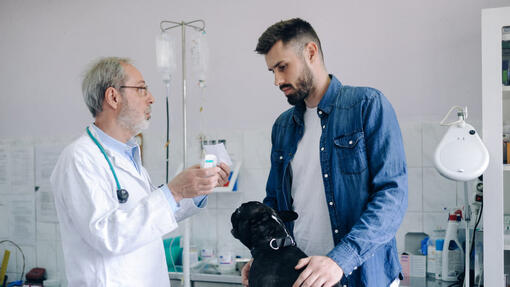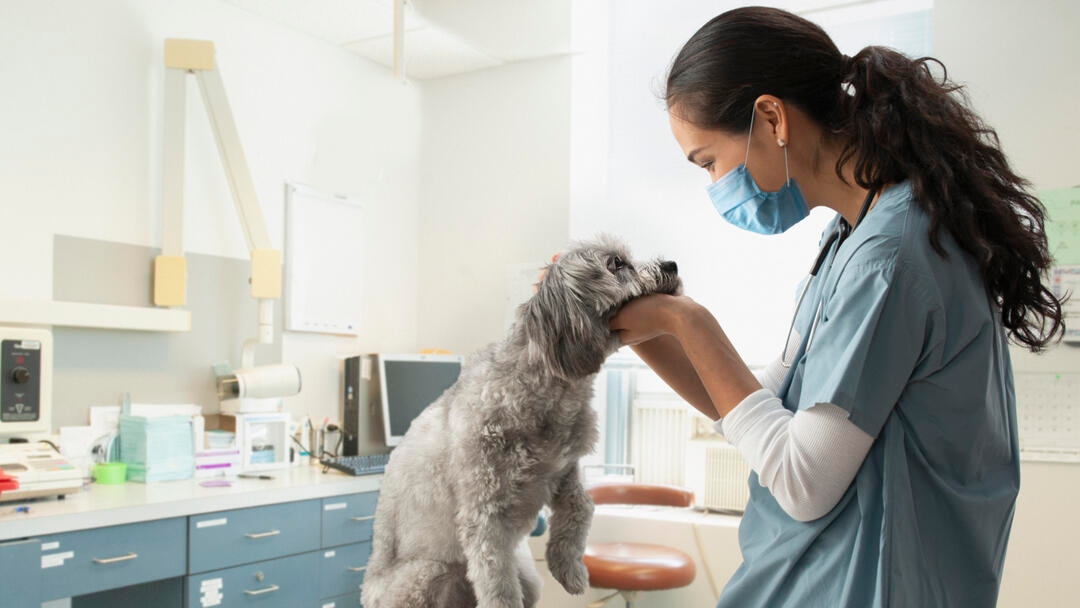
Just like us, our dogs sometimes need a little help to fight an illness, and that may mean a course of antibiotics. Antibiotics are what are known as prescription only medicines (POMs), in other words they must be prescribed by a vet.
You could be wondering ‘are antibiotics safe for dogs?’ Well, we’ve put together a handy guide. So, read on the find out what types of antibiotics for dogs are out there and why you should always follow your vet’s instructions when giving your pet a course of antibiotics!
Are antibiotics safe for dogs?
Just like medicines that us humans take, antibiotics can have side effects. Usually these side effects are mild, but if your pet is showing any abnormal signs while they are on antibiotics, you should consult your vet. Remember it’s vitally important that the antibiotics you give to your dog have been prescribed by your vet. The most common reason for prescribing antibiotics is if your pup has been diagnosed with a bacterial infection. Without treatment, in some cases the infection can escalate, and complications can arise.
Types of antibiotics for dogs
There are many different types of antibiotics and we’ve put together a short list of some of these, including the reasons a vet might prescribe them.
Amoxicillin for dogs
Amoxicillin is an antibiotic for dogs used to treat skin, respiratory, and urinary tract infections. It belongs to the same class of antibiotics as penicillin but is more resistant to stomach acids. It works by disrupting the formation of bacterial cell walls. Amoxicillin may be prescribed in liquid or tablet form.
Cephalexin – often used to treat bacterial skin infections (pyoderma) in dogs.
Enrofloxacin – used for a range of bacterial infections.
Gentamicin – used to treat certain bacterial ear infections.
Metronidazole – used to treat bacterial infections and some parasites.
Sulfamethoxazole-Trimethoprim – used for treating urinary tract, skin, respiratory, or digestive tract infections.
Tetracycline – sometimes used for inflammatory skin conditions in dogs.
Even if you have these drugs at home for your own use, always ensure that any antibiotics you give to your dog have been prescribed by a vet. The wrong antibiotics or the wrong dose can do more damage than good and may also increase the risk of antibiotic resistance! You should also ensure that your dog completes the prescribed course of antibiotics.
Why might my dog need antibiotics?
There are many bacterial conditions that can cause your dog to need antibiotics. Sometimes these bacterial infections can occur secondary to another illness. Check out the list of reasons your pup may need antibiotics:
If your dog is showing any signs of illness or you suspect that any of these conditions could be affecting your dog, make sure to contact your vet as soon as possible to get the correct treatment.
What are the side effects of antibiotics for dogs?
In rare cases, antibiotics for dogs can cause side effects and these will vary depending on the antibiotic. Some dogs may also have allergic reactions, which we have listed more on below.
Gastrointestinal upset
Some antibiotics can cause an upset stomach. Your vet might advise you to administer antibiotics with food to reduce this risk. Some signs to look out for are:
Microbiome imbalance
Antibiotics for dogs can kill the good bacteria, as well as the bad. In this case, there will be an internal imbalance of gut bacteria which might show itself as diarrhoea. The effects of this may not appear until sometime after, so it’s important to keep an eye on your dog. Probiotics might be recommended by your vet to restore the balance of good bacteria and keep your dog fighting fit.
Allergic reactions
Dogs can have allergic reactions to antibiotics, but it is relatively uncommon. Allergic reactions tend to happen soon after taking the medication but can develop at any time, so always keep an eye on your pup – even if you have given them the same kind of antibiotics before. Some signs of an allergic reaction to antibiotics for dogs are:
If you see any of these symptoms in your dog after giving them antibiotics, make sure to give your vet a call as soon as possible. They will be able to help you with the next steps.
Can dogs have human antibiotics?
You should only ever give antibiotics to your dog that have been prescribed by a vet. Whilst for example, amoxicillin for dogs is not dissimilar to the human version, vets are required to prescribe antibiotics that are licensed for use in dogs where possible. Vets are allowed to prescribe human antibiotics if there is no suitable dog antibiotic for treating a particular infection, according to what is called the prescribing cascade.
Now that you know all about antibiotics for dogs, find out how to keep your dog healthy with plenty of exercise!


















